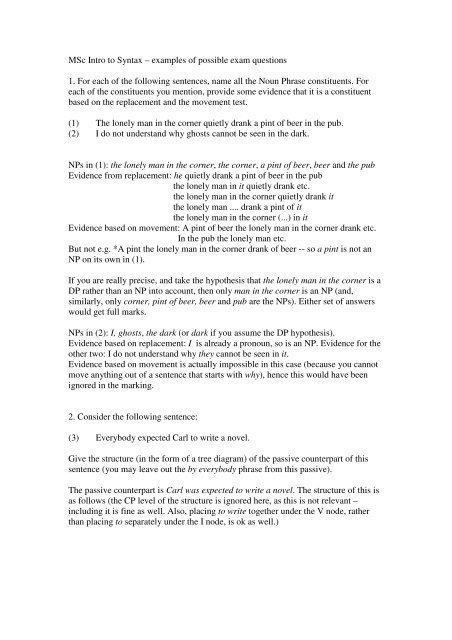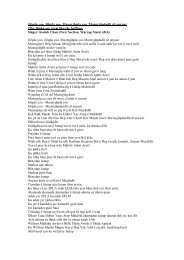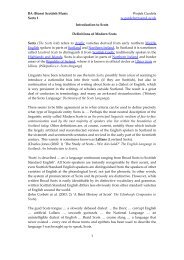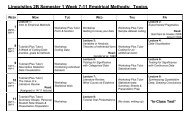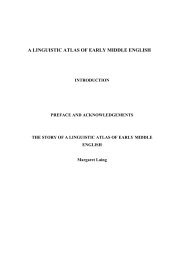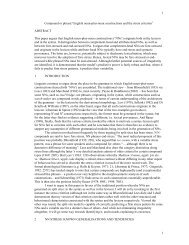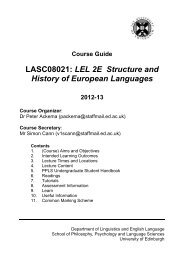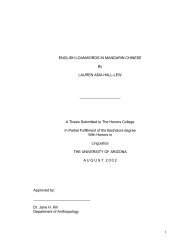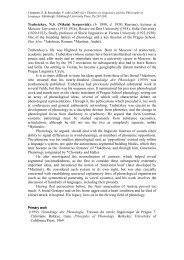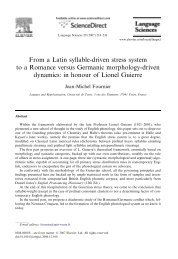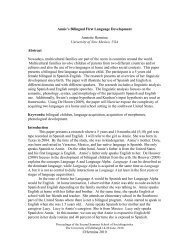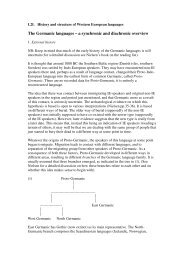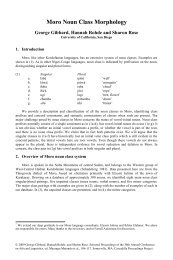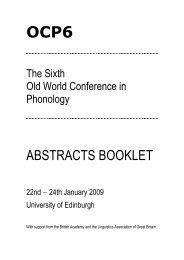includes the answers
includes the answers
includes the answers
Create successful ePaper yourself
Turn your PDF publications into a flip-book with our unique Google optimized e-Paper software.
MSc Intro to Syntax – examples of possible exam questions<br />
1. For each of <strong>the</strong> following sentences, name all <strong>the</strong> Noun Phrase constituents. For<br />
each of <strong>the</strong> constituents you mention, provide some evidence that it is a constituent<br />
based on <strong>the</strong> replacement and <strong>the</strong> movement test.<br />
(1) The lonely man in <strong>the</strong> corner quietly drank a pint of beer in <strong>the</strong> pub.<br />
(2) I do not understand why ghosts cannot be seen in <strong>the</strong> dark.<br />
NPs in (1): <strong>the</strong> lonely man in <strong>the</strong> corner, <strong>the</strong> corner, a pint of beer, beer and <strong>the</strong> pub<br />
Evidence from replacement: he quietly drank a pint of beer in <strong>the</strong> pub<br />
<strong>the</strong> lonely man in it quietly drank etc.<br />
<strong>the</strong> lonely man in <strong>the</strong> corner quietly drank it<br />
<strong>the</strong> lonely man .... drank a pint of it<br />
<strong>the</strong> lonely man in <strong>the</strong> corner (...) in it<br />
Evidence based on movement: A pint of beer <strong>the</strong> lonely man in <strong>the</strong> corner drank etc.<br />
In <strong>the</strong> pub <strong>the</strong> lonely man etc.<br />
But not e.g. *A pint <strong>the</strong> lonely man in <strong>the</strong> corner drank of beer -- so a pint is not an<br />
NP on its own in (1).<br />
If you are really precise, and take <strong>the</strong> hypo<strong>the</strong>sis that <strong>the</strong> lonely man in <strong>the</strong> corner is a<br />
DP ra<strong>the</strong>r than an NP into account, <strong>the</strong>n only man in <strong>the</strong> corner is an NP (and,<br />
similarly, only corner, pint of beer, beer and pub are <strong>the</strong> NPs). Ei<strong>the</strong>r set of <strong>answers</strong><br />
would get full marks.<br />
NPs in (2): I, ghosts, <strong>the</strong> dark (or dark if you assume <strong>the</strong> DP hypo<strong>the</strong>sis).<br />
Evidence based on replacement: I is already a pronoun, so is an NP. Evidence for <strong>the</strong><br />
o<strong>the</strong>r two: I do not understand why <strong>the</strong>y cannot be seen in it.<br />
Evidence based on movement is actually impossible in this case (because you cannot<br />
move anything out of a sentence that starts with why), hence this would have been<br />
ignored in <strong>the</strong> marking.<br />
2. Consider <strong>the</strong> following sentence:<br />
(3) Everybody expected Carl to write a novel.<br />
Give <strong>the</strong> structure (in <strong>the</strong> form of a tree diagram) of <strong>the</strong> passive counterpart of this<br />
sentence (you may leave out <strong>the</strong> by everybody phrase from this passive).<br />
The passive counterpart is Carl was expected to write a novel. The structure of this is<br />
as follows (<strong>the</strong> CP level of <strong>the</strong> structure is ignored here, as this is not relevant –<br />
including it is fine as well. Also, placing to write toge<strong>the</strong>r under <strong>the</strong> V node, ra<strong>the</strong>r<br />
than placing to separately under <strong>the</strong> I node, is ok as well.)
IP<br />
DPi I’<br />
Carl I VP<br />
was<br />
V’<br />
V IP<br />
expected<br />
ti I’<br />
I VP<br />
to<br />
ti V’<br />
V DP<br />
write<br />
a novel<br />
3.<br />
a. What causes <strong>the</strong> contrast in grammaticality between <strong>the</strong> following sentences?<br />
(4) a. Maria expected <strong>the</strong> kettle to boil over<br />
b. *Maria persuaded <strong>the</strong> kettle to boil over<br />
Whereas (4a) is an a.c.i. construction, (4b) is a control construction. In (4a), <strong>the</strong> kettle<br />
is <strong>the</strong> subject of <strong>the</strong> infinitival clause in complement position, and as such it fulfills<br />
<strong>the</strong> selectional restrictions that <strong>the</strong> verb boil over imposes on its subjects. In (4b),<br />
<strong>the</strong>re is an empty PRO subject in <strong>the</strong> embedded infinitival clause in complement<br />
position, which is controlled by <strong>the</strong> kettle (persuade is an object control verb: Mary<br />
persuaded Frances to read <strong>the</strong> book means that Frances, not Mary, read <strong>the</strong> book). In<br />
this case <strong>the</strong> kettle is <strong>the</strong> object in <strong>the</strong> main clause. This means <strong>the</strong> selectional<br />
restrictions of <strong>the</strong> verb persuade are violated here, since this verb selects objects that<br />
are human, or at least capable of intentional action.<br />
4.<br />
a. Why are <strong>the</strong> following sentences not well-formed?<br />
(5) a. #The star tries to emit radiowaves<br />
b. #Maria tries to emit radiowaves<br />
The verb try is a subject control verb, so in both <strong>the</strong>se cases <strong>the</strong>re is a PRO subject in<br />
<strong>the</strong> infinitival complement clause that is controlled by <strong>the</strong> subject of <strong>the</strong> main clause.<br />
This PRO subject has to satisfy <strong>the</strong> selectional restrictions of <strong>the</strong> verb in <strong>the</strong><br />
embedded clause, whereas <strong>the</strong> main clause subject has to satisfy <strong>the</strong> selectional<br />
restrictions of <strong>the</strong> verb in <strong>the</strong> main clause. In (5a), <strong>the</strong> subject of <strong>the</strong> main clause, <strong>the</strong><br />
star, violates <strong>the</strong> selectional restrictions of <strong>the</strong> verb try, since this verb must have a<br />
subject that is capable of intentional action. In (5b), <strong>the</strong> PRO subject in <strong>the</strong> embedded
clause violates <strong>the</strong> selectional requirements of <strong>the</strong> verb emit: since PRO is controlled<br />
by Mary, its referent is human, but humans do not emit radiowaves.<br />
b. For both (5a) and (5b), explain why its well-formedness does or does not change<br />
when we replace <strong>the</strong> verb tries with <strong>the</strong> verb seems.<br />
seem is a raising verb. The constituent that appears in its subject position is really <strong>the</strong><br />
subject of <strong>the</strong> embedded infinitival complement clause, which has moved to <strong>the</strong><br />
higher subject position. This subject <strong>the</strong>refore only has to satisfy <strong>the</strong> selectional<br />
restrictions of <strong>the</strong> embedded verb; seem never imposes any selectional restrictions on<br />
<strong>the</strong> constituent in its subject position. This means that (5a) will become grammatical if<br />
we replace tries with seems (<strong>the</strong> star seems to emit radiowaves), since <strong>the</strong> star does<br />
indeed satisfy <strong>the</strong> selectional requirements of <strong>the</strong> embedded predicate to emit<br />
radiowaves. In contrast, (5b) remains anomalous (#Mary seems to emit radiowaves),<br />
since, as noted, humans are not natural emitters of radiowaves. (Of course, it is<br />
possible to think of circumstances in which this sentence can be used, e.g. in a science<br />
fiction story, but those circumstances are precisely those in which <strong>the</strong> usual<br />
selectional restrictions of emit are suspended).<br />
5. For each of <strong>the</strong> italicized phrases, (i) indicate what <strong>the</strong> head of <strong>the</strong> phrase is (ii)<br />
indicate what <strong>the</strong> complement is, if <strong>the</strong>re is one (iii) indicate what <strong>the</strong> specifier is, if<br />
<strong>the</strong>re is one.<br />
(6) a. They flew right across <strong>the</strong> blue river<br />
b. I met a man who was extremely fond of eating banana ice cream<br />
c. To smoke cigarettes is a health hazard<br />
(a) head = across, complement = <strong>the</strong> blue river, specifier = right<br />
(b) head = fond , complement = of eating banana ice cream, specifier = extremely<br />
(unless you adopt <strong>the</strong> DegP hypo<strong>the</strong>sis, <strong>the</strong>n extremely = head, and no specifier)<br />
(c) head = to smoke (just smoke would also be ok), complement = cigarettes, no<br />
specifier<br />
6. The following sentence is ambiguous:<br />
(7) John was persuaded to marry in <strong>the</strong> church<br />
a. Give a paraphrase of both readings.<br />
b. For each of <strong>the</strong> readings, provide <strong>the</strong> structure <strong>the</strong> sentence has in this reading.<br />
reading 1: John was persuaded to do something, namely to marry in <strong>the</strong> church<br />
structure for this reading (again <strong>the</strong> CP level of structure is ignored as it is irrelevant<br />
here, but including it is fine as well):
IP<br />
DPi I’<br />
John I VP<br />
was<br />
VP IP<br />
V’ PROi I’<br />
V ti I VP<br />
persuaded to<br />
VP PP<br />
ti V’ in <strong>the</strong> church<br />
V<br />
marry<br />
reading 2: John was persuaded to marry, and <strong>the</strong> place where he was persuaded was<br />
<strong>the</strong> church.<br />
structure for this reading:<br />
IP<br />
DPi I’<br />
John I VP<br />
was<br />
VP PP<br />
VP IP in <strong>the</strong> church<br />
V’ PROi I’<br />
V ti I VP<br />
persuaded to<br />
ti V’<br />
V<br />
marry<br />
The crucial thing is to put <strong>the</strong> modifier in <strong>the</strong> church in <strong>the</strong> embedded clause in<br />
reading 1, but in <strong>the</strong> main clause in reading 2.


